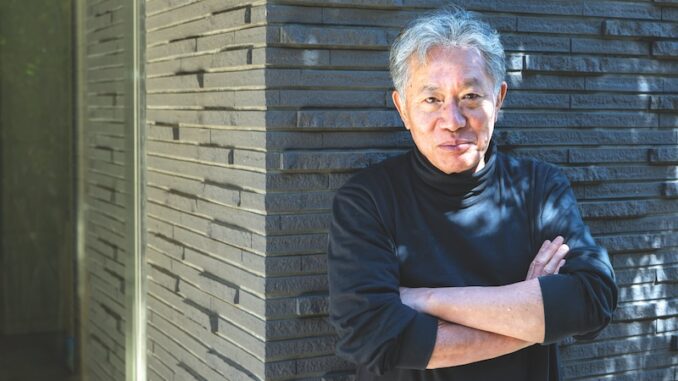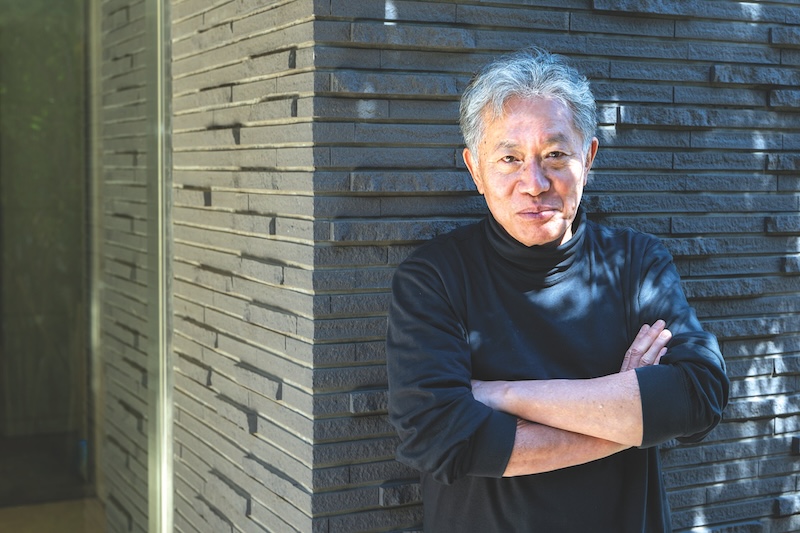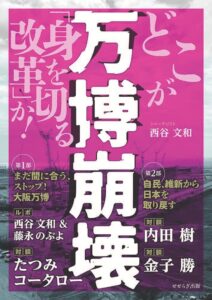

We cannot talk about Japan’s foreign affairs without mentioning Article 9 of the Constitution. Article 9 is a clause in the Constitution of Japan outlawing war as a means to settling international disputes involving the State. In 2001, you wrote an essay in defence of Article 9 in which you stated that the twin existence of war-renouncing Article 9 and the Self-Defence Forces was one of the most ingenious political compromises in history, and that as long as Article 9 and the Self-Defence Forces were in meaningful tension, Japan would remain an exceptionally safe country.
That was over 20 years ago. Has your opinion on Article 9 changed since then?
I have always been a supporter of the Constitution and my opinion has not changed. We should protect Article 9, no matter what. Some things have changed since 2001, and things like exporting weapons are done as a matter of fact. In this sense, Article 9 is more important than ever because that is the path that Japan should take. We’ve lost the idea of building a country based on certain peaceful ideals to the point that we are just following America’s instructions, and even Kishida doesn’t have a national vision. He was interviewed when he became prime minister and was asked what his goals were and what he wanted to achieve. He said he wanted to “work in human resources”. He was interested in deciding who should be the secretary-general and who should be the deputy-chairman. That’s what he wanted to do. So he did not and does not have any vision for what kind of country he wants Japan to be, nor what role Japan should play in the international community. Suga, the guy who preceded him, was the same. This is truly deplorable… Sorry, I’ve once again said something bad about Japan (laughs)”.
I’m afraid it will not even be the last time. For example, one of the reasons for the recent boom in inbound tourism is that the yen is very weak. A lot of people seem to share the opinion that Japan is becoming increasingly poor. Why is that?
Once again, it’s the politicians’ fault! The fact that we are so poor despite having such rich resources means that we are wasting money on unnecessary things. For example, they’ve been distributing tens of trillions of yen to foreign countries for a long time. They are getting kickbacks, of course. Also, the Liberal Democratic Party-led government is spending a lot on armaments. If we can find 43 trillion yen to buy weapons from the United States, why don’t we use them for medical care or education? What about childcare support?
Some people seem to think that when our country became richer and grew economically, it pushed people to improve their on-the-job performance. Actually, it was the complete opposite. The most important thing to increase national growth is that each and every citizen should contribute to its welfare. The more effort you make, the more powerful the country becomes, and the stronger the currency becomes. If everybody thinks like that, we can do our best. When you think about it, the best thing about democracy is that there is a correlation between everyone’s efforts and the fate of the country. Our destinies are strongly correlated. If we can agree on this point, everyone will give it their best. If we feel that all of us are decision-makers, we will be more than willing to participate in national politics.
However, that connection between the State and the citizens is now nowhere to be found. No matter what you do, things are not improving. No matter how much effort you put into your job, the government acts as if it has nothing to do with it. So people have stopped caring about their country.
Today, in Japan, in the elections for the local assemblies, the turnout rate is a measly 20%, and even in the national elections, when even 80% would be problematic, it’s as low as 50%. This is because at least half of the electorate thinks that if they have no power to change the country, they might as well abstain from voting. Anyway, it just makes no difference. They have lost the motivation to even try. Well, of course, Japan has become poor!
In recent news, the media are full of news about Japan’s average wages being low compared to OECD countries, about half that of the United States, and even lower than South Korea. There has been a continued decline in international competitiveness and scientific and technological achievements. As you just said, the government is responsible for Japan becoming poorer, but don’t you think that Japanese companies should also be blamed for this situation?
Of course, they have their share of responsibility. In the past, Japanese companies were run in a quasi-family-like manner. It was life-long employment with a seniority system, neither merit- nor performance-based. In any case, once you joined the company, you stayed at the company until you retired, so it was a kind of pseudo-family.
There was a rather lax system for evaluating work effectiveness and other things, so that at a certain age, everyone became a section manager, and then a general manager. Within this system there were overachievers and underachievers: people whose work brought the company many times their salary, and people who were not so skilled. However, the company left the underachievers alone and let the overachievers do most of the important work. They gave them more and more authority, increased the number of people working under them, and basically gave them a free hand. As a result, they eventually became company leaders. That’s how it worked.
However, from a certain point on, they gave up lifetime employment, and introduced meritocracy and head-hunting. They began to look for people with certain abilities and paid them accordingly. People who are recruited in this way don’t really have any loyalty to that company. They work this much and are paid this much. They’re not motivated to work more or exceed their employer’s expectations. In other words, overachievers have decreased. But in the end, as anyone who works in an organization will understand, it’s the overachievers who lead the organization. It’s the people who earn only 200,000 yen but end up doing work worth one million yen.
At the other end of the spectrum, since the end of the Bubble economy and especially the beginning of the 21st century, underachievers are being fired or penalized in some way; they are easily replaced with temporary staff. Obviously, it’s impossible to expect any sense of responsibility and loyalty from non-regular employees sent by temporary staffing companies. The greatest incentive to work for more than what they are paid is a sense of belonging to the organization and a sense of responsibility to fulfil the assigned mission. Companies who hire those people may be able to make use of cheap workers, but they cannot expect them to overachieve.
What Japanese companies are failing to see is that micro-management and creation never go together. If you want to run a creative organization, you have to loosen up on management to some extent. In such an environment, of course, there are those who fail and those who thrive, but, in the end, if you don’t have that type of company, overachievers won’t emerge.
Another reason why Japan’s national power is declining is that many people now tend to focus on increasing their own self-interests in the short term and have lost the habit of thinking about how to stably secure the interests of both themselves and the community over a long-term period. That spells the end of civil society and the nation-state.
According to Locke, Hobbes and Rousseau, modern civil society was established by accepting restrictions on some private rights for the common good. Rather than viewing everyone around you as the enemy and exhausting yourself mentally and physically in a war of all against all, it is better to accept restrictions on private interests. People understood that accepting short-term losses would result in long-term gains.
However, that mentality has disappeared. People who only focus on short-term profits are controlling the government, formulating policies and running businesses. They use public power to satisfy their own interests. When criticized for being cynical and greedy, they reply that they are only being “realists”.
As long as the pie is growing, people don’t complain much about how it’s divided. However, when the pie begins to shrink, people suddenly start asking, what criteria are you using to distribute it? Who is getting too much? Then the people in power come up with ways to increase their own share while reducing the others’ slice of the pie. That’s what’s happening in Japan right now. Since everyone is competing to reduce everyone else’s share, there’s no way the pie will get bigger or better. All they do is pull each other down and make everyone poor.
It’s about time we realized that neoliberalism has no future. It’s a blatantly exploitative ideology in which only the most productive members have the right to take a slice of the pie. That’s what we have been doing for 25 years. No wonder Japan is becoming increasingly poor.
The same thing has happened in academia. In 2004, the national universities became independent administrative institutions like stock companies. Then the faculty council was stripped of all their decision-making authority. Now everything is under the control of the top university president or chairman of the board, and everything is top-down. As a consequence, their academic results have suddenly shrunk and have fallen behind in international rankings. I always wonder why they don’t realize what they are doing is wrong. Only people who are allowed to work freely can make breakthroughs through innovation and creation. If you create a top-down organization, you’ll have to follow orders and strict rules and your performance will continue to decline.
Among Japan’s problems, you mentioned population decline earlier, which, at least to some extent, is related to the current state of the economy. Where can we find the clues to Japan’s revitalization?
It’s true that we’re amid a population decline. Japan’s current population is 125 million, and it’s predicted that it will eventually drop to about 50 million by 2100. However, if we only look at the numbers, it doesn’t look so bad. After all, 50 million was Japan’s population during the Meiji era. At that time, there were many cities all over the country, each with its own industry and unique culture, and everyone lived happily. A country with that many people will never die. Currently, Italy has 58 million and France 68.
The real problem is where it’s concentrated; more and more young people are moving to the big cities. If the current trend is not reversed, rural villages and other marginal places will be the first to go, then small towns and regional cities, until nearly all the population will be concentrated in Tokyo, Osaka and other metropolitan areas. This is a process that is being supported jointly by the government and public and financial institutions, and it’s extremely dangerous. No matter how you look at it, it’s not logical to gather all 50 million people in Tokyo because they can’t live together. Resources should be better distributed around the country, and we should all have a discussion and build a national consensus on this issue. Right now, though, there is no debate at all, and the concentration of people in Tokyo is increasing. If this process is not stopped, it’s going to destroy Japan.
But you asked about revitalization. I’ve been telling everyone who cares to listen that we should reverse the process of concentration, and that more people should move to less densely populated regions. We should provide resources to local areas for this purpose. Government agencies should also be moved away from Tokyo. After the last big earthquake in Tohoku, there was a proposal to move the capital and decentralize government functions in order to minimize risks in the event of a major earthquake directly hitting Tokyo. Even companies should spread out, and people as well. In any case, we live in an age where everything is connected via the internet, so there’s no need for everything to be concentrated in Tokyo. But I know it’s difficult. Even now, 35 million people live in the so-called Tokyo Metropolitan Region. There are already too many people, everything is expensive, and we spend the time stuck on crowded trains. That’s probably the world that Japanese people are trying to create right now, and I envision a nightmarish future when everything outside Tokyo is an uninhabited wasteland.
Well, I guess we’ll probably make things like nuclear power plants and solar panels and windmills to generate wind power, or dispose industrial waste in all those deserted areas. Since nobody lives there, there’ll be no need to manage the ecosystem, and no opposition from local residents, so they can do whatever they want. Now the government is taking the lead in telling people they should give up farming. Imagine a future when the rest of Japan is completely destroyed and the Tokyo metropolitan area is the only place where people can live. Frankly, I don’t want to see Japan in the 22nd century.
What do you think about allowing more foreigners to move to Japan?
I think it’s a good thing. However, in order to be inclusive of such diverse people, civic maturity is necessary, and this is not easy to achieve. Hamamatsu, for example, is a city that actually accepts people from other countries, especially from Brazil. They’re trying to educate these people and support them in many ways so that they can settle in Japan. Those are the people on the front line. However, if you look at Japanese people, it’s impossible for everyone to adapt easily to such a situation. Interacting with people who have a different lifestyle and culture requires a very high level of social ability, but looking at the Japanese today, I don’t have high expectations.
Of course, the number of foreign workers will continue to increase. Japanese capitalism requires manpower, so the Japanese Business Federation told the government to invite more people from abroad. The wider we open the door, the more foreigners will come. But what are we going to do with those people? There are zero resettlement programmes in Japan to help them. This can lead to a clash of cultures, and after a first honeymoon period when we welcome immigrants, racism naturally makes an appearance. People start saying that foreigners should leave. They say that they can’t understand their language, they eat smelly food and they’re always doing strange things. Naturally, xenophobia raises its head, and extreme political parties get more followers and sympathizers. In fact, far-right parties are already becoming a huge political force.
So on our side, extra manpower is definitely needed. I also believe that a society that embraces diversity in all its forms is wonderful, but we need the intellectual strength to welcome and embrace diversity and create a better society. This is something that Japanese people currently don’t have. So, first of all, we have to raise the ability of Japanese people to achieve this. We have to create a society where we can coexist with foreigners.
We also have to admit that there are no examples of countries around the world successfully accepting large numbers of immigrants. France has failed. Germany is failing. Britain has somehow succeeded, but in the case of the United Kingdom, it’s just that different ethnic groups live separately, and national unity has not been achieved. Same thing with the United States. This doesn’t mean they are living in harmony. So come to think about it, Japan has no successful model to imitate. In that case, we have no choice but to create one ourselves. In the end, both sides should make an effort. If the immigrants continue to follow their own customs even after settling in Japan, they will become socially isolated and coexistence is bound to be extremely stressful for both sides. We should keep stress levels within a certain limit. That often means accepting compromises. That said, it’s an experiment worth trying. Living together with people from other countries is a wonderful opportunity for the country to grow.
We can fairly say that the idea of treating immigrants as just manpower is wrong. Beyond contributing to the economy, once they arrive in Japan, it’s essential that they learn Japanese and the various rules and customs of Japanese society, otherwise they are going to have problems adapting.
Indeed, education is the most important thing. There are many children of foreign nationals now living in Japan, and they have the right to study, but are not obliged to attend school. It’s up to them and their parents. Many of them go a few times, but they can’t communicate with their classmates and teachers, they don’t understand the lessons, so they end up staying at home. Take the Brazilians in Hamamatsu I mentioned earlier. These kids speak Portuguese at home, but they don’t read newspapers or study their own language, so they only know conversational Portuguese. And of course, they can’t even speak Japanese well. Since they don’t attend classes, they don’t learn maths or other subjects. If they go to school while they are still children, they have time to catch up, but when they turn 18 or 20, it’s too late. These kids end up being semi-illiterate. I feel sorry for them if they can’t acquire basic knowledge and skills as living in Japan will be tough. The government should make school attendance mandatory even for immigrant children before they fall through the social safety net. This will become a big problem in about 10 years from now. Those kids will turn into angry people because they are neither Brazilian nor Japanese.

Many Japanese are afraid that opening the country to immigration will lead to the deterioration of traditional culture. As a long-time martial artist and Noh practitioner, you have made many efforts to preserve Japanese culture, including opening a space called Gaifukan in 2011. What kind of place is that?
We live in times when many people commit suicide, the birthrate is declining, the population is aging and the number of single people is increasing. Social isolation is gradually increasing, and one of the reasons is that local communities are disintegrating. Still, we need to support each other in some way. Well, I felt a very strong sense of mission in creating that kind of intermediate community. In 2011, Tohoku was devastated by a triple disaster, and I thought that I wanted to create a place where, in the event of another earthquake in Kobe where I live, a few dozen people could find refuge for a short period. Expanding on that idea, I wanted to create a public place where people who were in trouble would be accepted. Public spaces created by individuals are more public than public spaces created by governments, probably because they can do what they like. That’s what I wanted to create, so I could manage it properly.
One peculiarity of the Gaifukan is that we recognize that religion is part of our lives. All public facilities are based on the concept of separation between church and state. However, I wanted to add an altar. Gaifukan is also used as a martial arts dojo, and martial arts are, in a sense, just like religion. Dojo are also used for Buddhist training.
We also have a Nohstage and present all kinds of traditional performing arts like rakugo. But it’s not all about Japan. We have also had Italian opera singers come and perform, and we stage plays and arrange seminars
Gaifukan is a space that can be used freely in many ways. So, all that’s left to do is create a network of people and help each other out when something goes wrong. Even during the coronavirus pandemic, when people became infected, we received SOS calls from members who said they couldn’t leave their homes, so we all started delivering food and medicine. If you add in about 200 members and their families, you have a community of nearly 1,000 people and are able to do all kinds of things. By creating this kind of network, we’re able to reach out to and help many people. It’s like a family.
You have been practicing Aikido and other martial arts for many years. However, you are against making them compulsory in public junior high schools. Why is that?
When I expressed my opposition, a junior high school education committee had just published a report on that subject. However, among members of that committee, there was no one with any experience in martial arts. One of the recommendations they made was that teachers would be able to improve students’ manners and increase their spirit of patriotism through martial arts. Patriotism?! Martial arts have nothing to do with patriotism! If you want to teach students to be polite, create a subject called etiquette. If patriotism is so important, write a song. Just don’t use martial arts as a means to achieve such trivial things as politeness and patriotism. After all, martial arts is training. They have nothing to do with national affairs. By diligently training yourself, you can increase your own wisdom and strength for living. It’s a very personal activity, and I felt angry that the purpose of martial arts was being trivialized, so I told them what I thought. That’s why I opposed it. Of course, I wasn’t really understood (laughs).
Speaking about seminars and schools reminded me that you have quite an interesting academic history. In your second year of high school, your grades were the worst in your class and you were later expelled from school for poor behaviour. You ran away from home and took a part-time job at a jazz cafe, but were unable to support yourself and eventually returned home a few months later. Although you dropped out of high school, you later passed the university entrance exam and entered the prestigious University of Tokyo.
Haha! Yes, you could say I wasn’t your typical student.
But to me, the most interesting part is that you are a former student activist. How long were you active in the movement?
For about three years, that’s for the first three years of university, from around 1970. I was an independent, not a member of any particular group, but like many other youngsters, I felt that we had to do something. Actually, the student movement in Japan was basically an anti-Vietnam War movement. The first two major events in those years were the Haneda struggle and the Sasebo struggle, which were both battles to stop the US military from going to Vietnam and killing Vietnamese people. Then we also fought for students’ rights, but the anti-Vietnam War movement was probably 90% of my motivation. As you know, Japan was serving as a logistics support base for the US military, which was fighting in Vietnam, and the country became economically prosperous thanks to that war and the Korean War before that. That’s how Japan achieved the so-called economic miracle. I’d say that’s very embarrassing. After all, we Japanese university students were a privileged minority. The Japanese economy was prospering from the Vietnam War, and I felt ashamed of myself because I was benefiting from the situation. That’s why we wanted to tear down our universities.
If you looked at it from the outside, it was a strange thing. It felt like a sort of self-punishment; getting beaten up and covered in blood helped heal my guilty feelings. More than anything else, I had a sentimental approach to the movement. I kept self-analyzing and started thinking about what this movement was all about, and why I needed to take some action. In any case, if we really wanted to bring about a political revolution in Japan, it would be impossible unless revolutionary ideas emerged from Japan’s indigenous culture. I didn’t think Marxism would work, but what if there was a theory of political revolution that could emerge from traditional Japanese culture?
If you look at other countries, many had civil revolutions. It’s difficult to understand why there was no civil revolution in Japan. However, we now have the Constitution of Japan, which was given to us by America and was acquired by the Japanese through political revolution. South Korea and Taiwan both had their own civil revolutions and became democratic, but Japan acquired democracy because we lost the war. I’ve always felt that Japan is civically immature. That’s our underlying disease. So what kind of civil revolution would the Japanese be able to carry out on their own? This has been my ideological challenge for half a century since my student days.
Looking back at that period, how do you judge the student movement of the 60s?
It was both positive and negative, but most importantly, I think it was inevitable. There was a great sense of necessity, and it gave me a lot of ideas about what a political revolution in Japan should look like. It ended in failure, but at least in 1968 and 1969 most of the universities in Japan were in a state of anarchy. The fact that we created such a huge upsurge must have been due to some kind of force. So, the question is, where did that power come from? I’ve been thinking about that all these years. I feel like I want to do that again. I want to experience that feeling of elation again.
I recently saw a programme on TV about the Chukakuha (Central Core Faction), a far-left revolutionary group that emerged in 1963 and was active among radical student groups. A TV crew interviewed Ishida Mayumi from the political bureau and made a toured one of their Headquarters. Do you think it makes sense that such a group is still active in the 21st century?
I don’t think so. The historical mission of those political factions is already over. Today, doing the same thing again and again is more akin to traditional performing art, don’t you think? It has zero social influence. They scarcely make the news, fewer. As a political force, they are worth almost zero.
One last question: next year, Expo 2025 will be held in Osaka. Are you looking forward to this World’s Fair?
I’ve been against it from the beginning. As you know, they want to hold it on Yumeshima, an artificial island, but the real reason for promoting the Expo is that they want to open an integrated resort with a casino. Right now, there is almost nothing on that island apart from two container terminals. Before developing anything down there they need to improve the plan, things like ground improvement, building water and sewage systems and subway lines. We’ll do anything to get people to come to the casino. So that’s why they decided to hold the Expo, it’s just an excuse. The casino comes first. Since building a casino is expensive but they can’t use tax money for that purpose, they used the Expo to obtain the necessary financing.
I remember when members of the Expo Association, during the early stages of the project, came to my office to ask us what they should do. You see, they had zero ideas about what to actually do with the event. It’s just about making money. Today’s powerful people in Japan only want to cling to power as long as possible and make money, but they have no idea what they want to achieve with that money and power.
I think the Expo is a huge mistake. It’s going to be a disaster of historic proportions and run up a huge deficit. And even if they manage to open the Expo and attract millions of people, there are no means of transport to get them to Yumeshima. It’s awful, just awful.
Interview by Gianni Simone
To learn more on this topic, check out our other articles :
No141 [FOCUS] Japan as seen by Uchida Tatsuru – 1/3
No141 [FOCUS] Japan as seen by Uchida Tatsuru – 2/3
Follow us !










